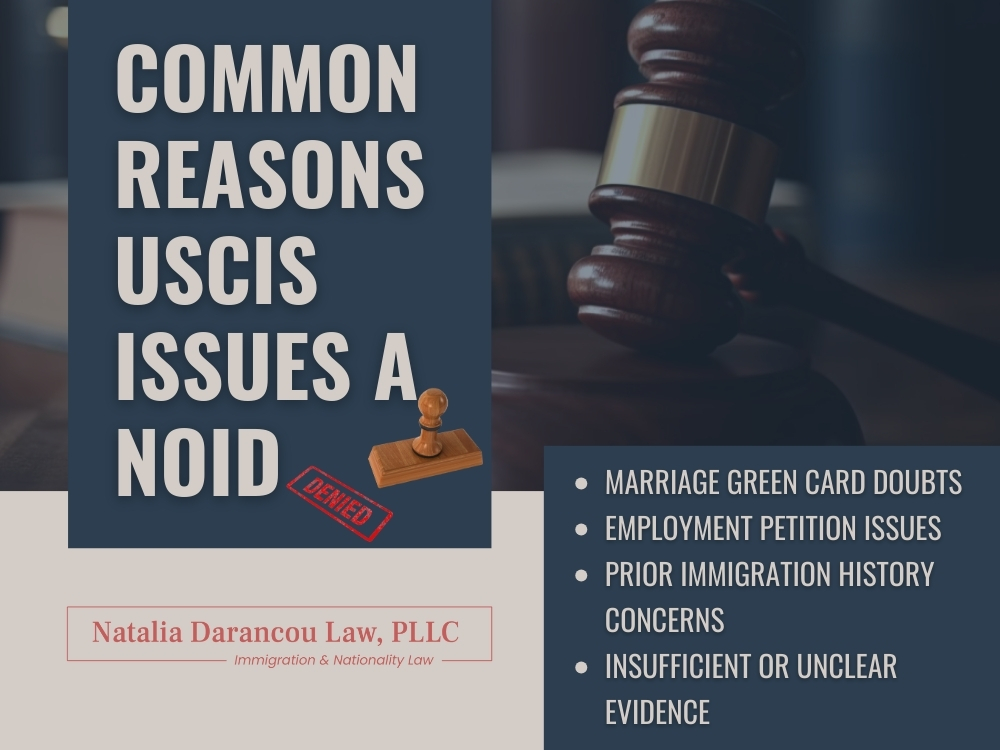Notice of Intent to Deny (NOID)
What is a NOID?
A NOID from USCIS, or a Notice of Intent to Deny, is a formal letter issued by U.S. Citizenship and Immigration Services (USCIS) to inform applicants that their case may be denied unless specific concerns are resolved. Receiving one can feel alarming, but it is not the same as a final denial. Instead, it provides an opportunity to strengthen your case by supplying additional documentation, explanations, or clarifications that directly address the issues raised.
For many applicants, a NOID is a turning point in their immigration process. A well-prepared response can make the difference between a denial and an approval. At Natalia Darancou Law, we help clients review their notices in detail, identify what USCIS is questioning, and craft comprehensive responses that give their applications the strongest chance of success.
Table of Contents

Request A Consultation Today!
Request Help Today
Get the Immigration Assistance You Deserve And
Schedule Your Consultation Today!

4.9 Google Rating
We have a 4.9 Star Rating with over 30 reviews on Google!

Woman Owned
We are a woman-owned company and proudly committed.

Native Spanish Speaker
Natalia Darancou was born and raised in El Paso, Texas to Mexican-American parents and is a native Spanish speaker.

Memberships
Member of the New York State Bar, Texas State Bar, and a member of the American Immigration Lawyers Association (AILA).
When Is a Notice of Intent to Deny Most Commonly Issued?
A USCIS NOID is typically issued when the evidence submitted with an application does not fully satisfy eligibility requirements. Some of the most frequent situations include:
- Marriage-based green card cases where USCIS questions whether the marriage is genuine.
- Employment-based petitions that lack required documentation or include inconsistencies.
- Applications with prior immigration history that raises concerns about admissibility.
- Cases with insufficient or unclear evidence, even after earlier requests.

In each of these scenarios, the notice gives the applicant a final chance to provide convincing documentation. Submitting strong, targeted evidence is the key to moving the application forward.
What Is a NOID Delay? Understanding Immigration Processing Setbacks
One major challenge of a NOID from USCIS is the delay it adds to your application. First, applicants are given a specific timeframe to prepare and submit their response. After that, USCIS must review the additional evidence before making a final decision.
Although this can extend processing times, the delay is often worthwhile if it leads to an approval. The most important step is ensuring your response is strong, clear, and comprehensive.
How to Respond to a Notice of Intent to Deny From USCIS
Responding effectively to a Notice of Intent to Deny from USCIS requires three essential steps:
- Understand the concerns: Review the notice carefully to identify every issue raised by USCIS.
- Gather relevant evidence: Collect documentation that directly addresses the concerns, such as affidavits, records, or clarifying information.
- Prepare a clear response: Organize your reply so that each issue raised in the notice is answered with supporting evidence.
This is your opportunity to demonstrate that you meet the eligibility requirements and to correct any misunderstandings or gaps in your application. Applicants who take the time to prepare a comprehensive reply often succeed in overcoming the concerns outlined in the NOID.
If you prepared your application on your own and received a NOID, that’s a major sign to bring in professional help. An experienced immigration will have dealt with USCIS NOIDs before and will know what they’re looking for in a resolution.
Where Do You Submit Your Response to a Notice of Intent to Deny?
Every NOID includes specific instructions on how and where to submit a response. In most cases, you will send your reply to the same office that issued the notice. However, it is important not to assume—always check the instructions carefully to ensure you are sending the materials to the correct address.
Equally important is meeting the deadline. USCIS generally allows 30 days from the date of the notice, though timelines can vary depending on the case type. Failure to respond on time or sending your reply to the wrong location almost always results in a denial.
Schedule a Consultation with Natalia Darancou Law
If you’ve received a USCIS NOID, the time to act is limited. The strength of your response can make the difference between approval and denial of your application. At Natalia Darancou Law, we carefully analyze every notice, gather the necessary evidence, and prepare comprehensive responses tailored to your situation.
Contact our office today to schedule a consultation and discuss your case with an experienced immigration lawyer. Taking action now gives your application the best chance of success.


